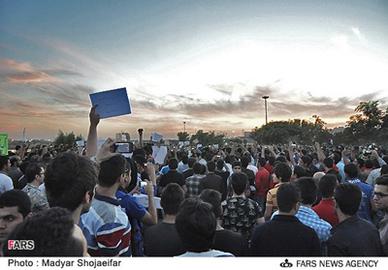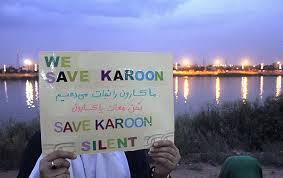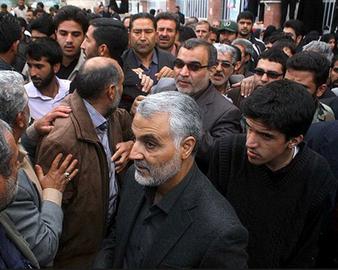
Thousands of Iranians gathered in the southern city Ahvaz, the capital of Khuzestan province, last Friday to hold their fourth protest against the diversion project of Karun River.
Protesters formed a human chain along the western bank of the Karun and held placards in Persian and Arabic reading “We are all Karun,” “Take air away but do not take Karun from me,” and “Karun is Iran’s artery” in an attempt to stop the diversion project, which they say will endanger the river's ecosystem.
The diversion project, called “Behesht-Abad,” is a conveyance scheme designed to redirect water from the Karun basin to provinces on the country's central plateau, including Zayanderud River in Isfahan.
Zayanderud, which means 'giver of life' in Persian, helped establish Isfahan as an influential center and brought greenery to what is effectively a city in the middle of the desert. But for the past several decades Isfahan has been afflicted with water shortages.
Over the past 40 years the Iranian government has established three similar projects to deal with the central plateau's water crisis. Kouhrang One, Two and Three have conveyed up to 930 million cubic meters water from Karun’s basin to the central provinces including Zayanderud.
But it seems that the water crisis is worsening each year. In the past summer, Zayanderud’s cracked riverbed became visible once again. Some attribute the water crisis to mismanagement of water supplies, some blame drought and others, including officials from Isfahan, are working on the Behesht-Abad project, which aims to convey over a billion cubic meters of water from Karun to Isfahan, Yazd and Kerman provinces.
A Pro-Isfahan Central Government?
A number of Iranian governing bodies, from the Department of the Environment parliament itself and most recenlty the Department of Water Resource Management in 2011, have objected to the Behesht-Abad Project. But authorities have ignored this opposition and launched the project's first phase in September 2012.
Around this time the protesters had gained the support of Vice President Masoumeh Ebtekar, Governor of Khusestan Abdolhossein Moghtadaei and MPs from Khozestan and Char-Mahal provinces. But the MP of Ahvaz, Shokr-e-Khoda Mousavi, says that the power in Rouhani’s administration is in the hand of figures from provinces in central Iran such as Isfahan and Kerman, and has moved ahead with the project.
Mousavi complained in an interview last week with IranWire that Isfahan has been disproportionately represented in government over the past 15 years, leading to officials who hail from that province to push through irrigation schemes that benefit Isfahan at the cost of provinces like Ahvaz.
“We have seven ministers from Isfahan in Rouhani’s administration, seven Isfahani ministers in Khatami’s administration, and two or three in Ahmadinejad’s administration. While they're in power they only think about interests of their province.” Mousavi said.
That senior officials who are meant to act on the behalf of all Iranians actually enact policy to benefit a particular region, Mousavi says, creating animosity in regions like Ahvaz, which tend not to be represented at the cabinet level. “We citizens of Khuzestan don’t have any one in top of the government or even the body to protect us. The problem is they have the power but we have not. This is a fact that citizens of Khuzestan should know. But my question is if citizens of a province don’t have any one in power, have they committed a sin?” he said.
He criticized Rouhani’s administration for ignoring the demands of citizens in Khuzestan. “This is discrimination, ruthless discrimination. We made our demands clear but as long as we are legislators we are moving according to the law,” he said.
Khatam Al-Anbia Once Again
The Iranian government has awarded the contract for the controversial project to Khatam Al-Anbia, the Revolutionary Guards' major engineering arm and one of Iran's largest contractors in industrial and development projects.
The head of Isfahan's department of water supply said last August that the contract with Khatam Al-Anbia amounted to $1.7 billion, and that it had received necessary reservations and permits for execute phase of the project.
But the executive phase of Behesht-Abad project had launched, according to officials, before the total budget for the project was secured.
The head of Isfahan's department of water supply has suggested that sufficient budget would be provided by land use change.
“Changing the usage of lands owned by government will increase their value. Then there is a possibility to cover the budget for Behesht-Abad project by selling them or concede them to the contractor,” Mohammad-Ali Torfeh, head of Isfahan's department of water supply, said in early September.
In the interview, Shokr-e-khoda Mousavi, the MP of Ahvaz, explained that “no contractor will take pity and reimburse expenses for no reason” but if Khatam Al-anbia agreed to execute the project without a budget, it's not clear how the budget will eventually be funded. He says the Rouhani administration has permitted the project to go ahead, in coordination with ministers from Isfahan.
Fixing the Facts?
Karun River which for years ago was the only river in Iran with the capacity for shipping transport, is reportedly is facing its own lack of water. Its depth in some places near Ahvaz has been reduced to one meter.
But officials from Isfahan say that diverting another billion cubic meters of Karun’s water will have no detrimental impact on the Karun's water supplies.
“We can figure out how to prevent the Karun's water from becoming mixed with saltwater, so protesting this project isn't rational,” an Isfahan MP, Hossein-Ali Hajji, said last week according to Fars News Agency.
“We encouraged the authorities during several sessions and made a documentary about the water crisis in Isfahan that impressed Rouhani and his deputies” Hajji said.
But the Ahvaz MP suggests the Isfahan contingent is playing loose with the facts. He says that according to municipal studies conducted in Ahvaz itself, diverting water from the Karun will cause seawater from the Persian Gulf to overflow into the Karun riverbed, an incursion of seawater of 50 to 60 kilometers.
“If our friends in Isfahan need drinking water, the citizens of Khuzestan are not unmerciful, we will share if we have enough to do so. But our question is this: if the Karun had the capacity, then why are we facing our own problems in supplying water to the immediate area?” he said.
Ahvaz and its environment face mighty challenges of their own. The city is the most polluted on earth, according to the latest findings of the World Health Organization, and this pollution has created a shorted of drinking water in Khuzestan. These problems have flashed across the nation's newspaper headlines, but they've failed to draw significant attention from the government in Tehran, local activists say.
One citizen of Khuzestan who participated in last week's protests told IranWire he thinks the situation is dire and that the impact of desertification will mean an influx of dust into the air, leading to disease and pollution.
“The lives of millions of people in southern Iran are dependent on the Karun. If the water levels drop, farmers will lose their groves, the land will become desert,” he said. “What all this amounts to is discrimination, a discrimination that doesn't consider the lives of the people of Khuzestan worth living.”
Farshad Mohammadi is an Iranian journalist. He has previously worked at Radio Zamaneh in the Netherlands and Radio Free Europe's Persian service. Follow him: @Farshadmm
visit the accountability section
In this section of Iran Wire, you can contact the officials and launch your campaign for various problems

























comments